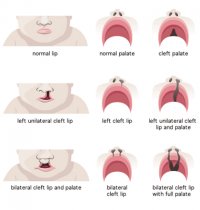Cleft palate Surgeries

Causes
Doctors don't always know why a baby develops cleft lip or cleft palate, but many clefts are thought to be a combination of genetic (inherited) and environmental factors (like certain medications or vitamin deficiencies). Both mothers and fathers can pass on a gene or genes that cause cleft palate or cleft lip. Clefts happen more often in children of Asian, Latino, or Native American descent.
Taking certain medicines (such as some anti-seizure medications) during pregnancy can increase a woman's chances of having a baby with a cleft lip or palate. Similarly, moms who don't get the right amount of prenatal nutrients (for example, not enough folic acid) may increase their baby's risk of having a cleft. A mother's exposure to certain chemicals also may cause a cleft.
Women who smoke cigarettes, use drugs, or drink alcohol during pregnancy also increase their baby's risk for birth defects. Research has shown that moms who binge drink (drinking four or more drinks in a short period of time) during the first weeks of pregnancy have a higher risk of having a baby with a facial birth defect like a cleft lip or cleft palate.
Related Health Problems
As you might imagine, cleft lip and cleft palate can affect many actions of the mouth and face. Children born with cleft lip or cleft palate might have issues related to their feeding, hearing, teeth, and speech.
Feeding Problems
Babies with just a cleft lip don't usually have feeding problems. But when the palate is involved, feeding can be a bigger challenge.
Normally, the palate prevents food and liquids from entering the nose. A cleft palate causes babies to swallow a lot of air and regurgitate food into the nose. It also makes it harder for babies to latch on and suck during breastfeeding or bottle feeding. As a result, a baby with a cleft palate may need a special nipple and bottle to receive pumped breast milk or formula. Breastfeeding moms might want to talk with a lactation consultant, who can offer more guidance and suggestions.
Babies with feeding issues should be seen regularly by a doctor to make sure that they're gaining weight well.
Middle Ear Fluid Buildup and Hearing Loss
Many children with cleft palate are at risk for fluid buildup in the middle ear. This fluid can't pass through the Eustachian (yoo-STAY-shun) tube as it should, which can lead to ear infections and even hearing loss. So kids with cleft palate usually need ear tubes placed in their eardrums to help drain the fluid and improve hearing.
Kids with cleft palate should have their ears and hearing checked once or twice a year, or more if they are having hearing problems.
Dental Problems
Children with a cleft lip and palate often have dental problems. These can include small teeth, missing teeth, extra teeth (called supernumerary), or teeth that are out of position. They may have a defect in the gums or alveolar ridge (the bone that supports the teeth). Ridge defects can displace, tip, or rotate permanent teeth or prevent permanent teeth from coming in properly.
You might also like

|
Rustic Charity Website Banner X 2 Peel and Stick Fabric Wall Sticker by Wallmonkeys Wall Decals Home (WallMonkeys.com)
|




